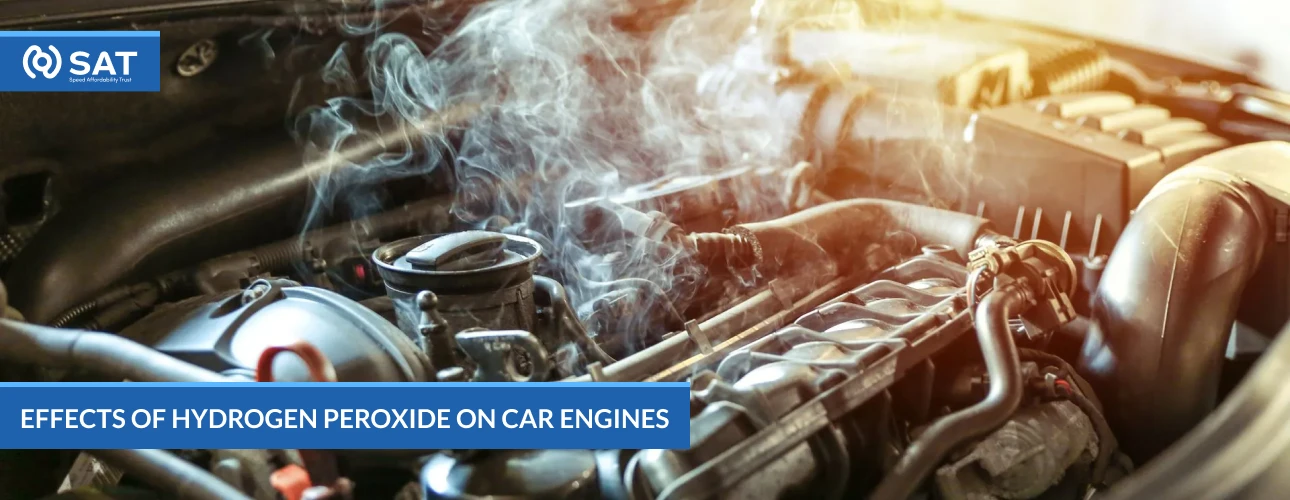One comes across countless tips and tricks on online forums being discussed amongst petrol heads who have also once heard these myths from a distrustful source. Amongst such myths is the one of Adding Sugar to Your Fuel System to improve fuel efficiency. Written below is the analysis of the science (and majorly fiction) behind these rumors.
The Chemical Make-up Of Hydrogen Peroxide
To discuss what hydrogen peroxide is made up of, chemically the substance is a compound with the formula H202, which is water with an additional oxygen molecule bonded to it. Hence, this makes hydrogen peroxide an effective oxidizer that is used substantially for domestic purposes such as cleaning, whitening, gardening, removing stains, etc. However, just because its uses seem harmless, does not make the substance harmless to mix with gasoline. Water Enters your Gas Tank can lead to serious issues with your vehicle’s performance and safety.
What Happens When You Add Hydrogen Peroxide To Your
Car’s Engine System
This should not come as a surprise that Hydrogen Peroxide is one of the worst liquids to put in your car gas tank. No matter where you got the idea of adding hydrogen peroxide to increase the fuel efficiency of your car, or just give it a bit of an extra uplift, do not try it at home! Here are the reasons explaining The Impact of Coke on Your Car Engines and what happens:
Hyper Oxidation:
Gasoline is designed in a way to complement your engine and be combusted consistently and in a controlled manner. When hydrogen peroxide is added to the fuel tank, the linear and controlled combustion gets exacerbated and the extra oxygen leads to your fuel being burned too hot. This can lead to a massive catastrophe in the worst-case scenario. Bleach Can Destroy Your Car Engine if it interacts with fuel, causing similar issues and potentially severe damage.
Corrosive Chemical:
Hydrogen Peroxide is known to be a corrosive chemical. Once it gets mixed into your fuel tank, it can be detrimental to the inner machinery of your car because once in contact with the metal, hydrogen peroxide will keep chipping away the insides of your fuel tank and car engine and lead to corrosive build-up which will in-turn cause long-lasting damage. This makes it one of the Worst Liquids to Put in a Car Gas Tank.
Catastrophic Foaming:
Dangers of Salt in Your Gas Tank can be significant. Hydrogen Peroxide is a chemical that completely dissolves in water but it produces exceptional fizz and gas bubbles when it does so. Now picture hydrogen peroxide fizzing and producing heat in a tank full of gasoline; the results are not so great even in the imagination.
Erratic Performance:
Let us suppose your car somehow survives all the above-mentioned damages and is still running; this would make your car an even bigger hazard to be around. The uneven combustion in your engine will cause poor acceleration and loss of control, and in the worst case, failure of the engine in the middle of the road.
Conclusively, hydrogen peroxide is one of the worst materials you could add to your gas tank which will cause nothing but a concoction of stress and misery to your day. There will be none other than completely catastrophic and dangerous consequences for you to face after you make such a decision. SAT Japan takes your car purchase and maintenance as a personal responsibility and you should research thoroughly before adding an unknown substance to your engine.
Now that you have a deeper understanding of exactly what effects hydrogen peroxide has on the inner workings of your car’s fuel tank and engine, let us move on to the other burning questions some may have:
FAQs
Can Hydrogen Peroxide Increase Horsepower?
Ans. Although the combustion power of hydrogen peroxide would have you believe that it would produce more energy for your car, this idea is a terrible one in practicality. Even adding just a small quantity of this corrosive substance entering the engine will lead to costly repairs.
What to do if I accidentally poured hydrogen peroxide into my gas tank?
Firstly, there is no need to panic because the deed here has been done; instead, the best course of action forward is to take your vehicle to the closest repair shop and leave it in the hands of a professional to revive your car. It is advised to take care of the damage promptly because the longer a foreign substance stays in the engine, the further messed up the situation will get.
Can I clean the fuel injectors of my car with hydrogen peroxide?
Although hydrogen peroxide is widely known for cleaning efficiently, rest assured it is entirely not recommended for your injector system. If you are looking for substances to do the internal cleaning of your car, there are specific additives for this job.
Is there any situation where adding hydrogen peroxide to the gas tank would be a good idea?
Short answer, no longer answer, absolutely not. There is no recommendable scenario where the addition of hydrogen peroxide to your fuel tank is non detrimental to the inner workings of your car. The only thing hydrogen peroxide may cause is a dent in your wallet when you get the damages fixed.
Is there a safe amount of hydrogen peroxide I may add to the gas tank?
No, there is no safe amount of hydrogen peroxide to be added to your fuel tank which will not cause unnecessary damage to your car and stress to your life. It is best to leave the cleaning products for your home and use appropriate materials such as fuel tank additives which target impurities in the fuel tank to increase the efficiency of your car.




